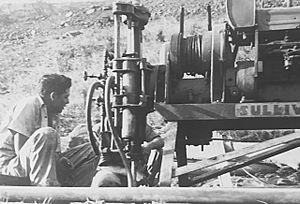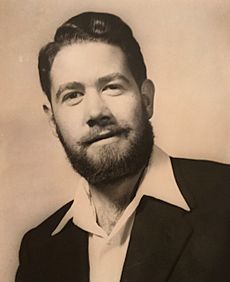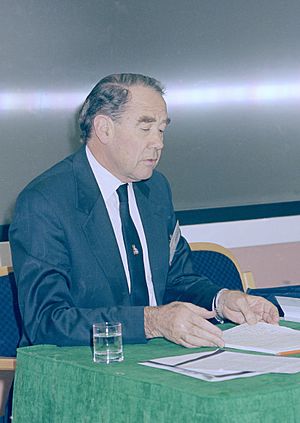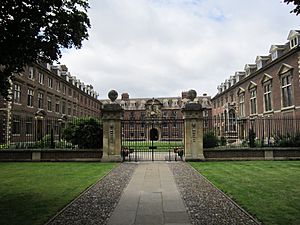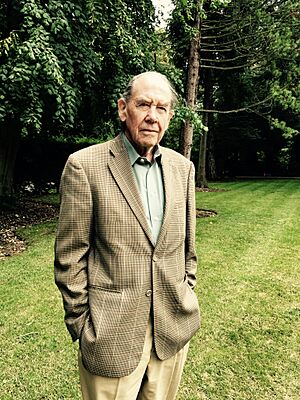Terence English facts for kids
Quick facts for kids
Sir
Terence English
|
|
|---|---|
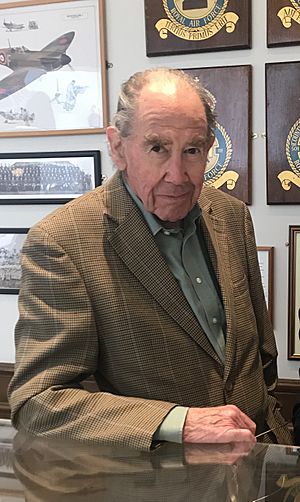
English, Airport House (August 2017)
|
|
| Born |
Terence Alexander Hawthorne English
3 October 1932 |
| Died | 23 November 2025 (aged 93) Iffley, Oxfordshire
|
| Nationality | British citizenship |
| Education | Witwatersrand University Guy's Hospital Medical School |
| Known for |
|
| Awards |
|
| Medical career | |
| Profession | Cardiothoracic surgeon |
| Field | Cardiothoracic surgery |
| Institutions | Papworth Hospital, Cambridge |
| Research | Cardiac transplantation |
| Awards |
|
Sir Terence English (born October 3, 1932 – died November 23, 2025) was a very important British heart surgeon. He was born in South Africa. He led the team that performed the UK's first successful heart transplant in August 1979 at Papworth Hospital. This made Papworth Hospital one of Europe's top places for heart and lung transplants.
Before becoming a doctor, Terence English studied mining engineering. But he was inspired by his uncle, who was a surgeon, to switch to medicine. He moved to London for his medical training. He became very interested in heart surgery, especially heart transplants.
Sir Terence English also held many important leadership roles. He was the president of the Royal College of Surgeons and the British Medical Association. He received a special honor and was made a Knight in 1991 for his amazing work.
Contents
- Early Life and Education
- A Career in Surgery
- Other Important Roles
- General Medical Council (1983–1989)
- President of the International Society for Heart Transplantation (1984–1985)
- President of the Royal College of Surgeons (1989–1992)
- President of the British Medical Association (1995–1996)
- Master of St Catharine's College Cambridge (1993–2000)
- Trustee of the Hunterian Museum (1994–)
- Awards and Honors
- Retirement
- Personal Life and Passing
- Books and Publications
Early Life and Education
Terence English was born on October 3, 1932, in Pietermaritzburg, South Africa. His parents were Mavis and Arthur English. Sadly, his father passed away when Terence was only two years old.
School Days
Terence attended Parktown Preparatory School in Johannesburg. When he was ten, he went to a boarding school called Cordwalles School in Pietermaritzburg. He finished his schooling at Hilton College in 1946.
From Mining to Medicine
After school, at age seventeen, Terence worked for a year in what is now Zimbabwe. He was a diamond driller, helping to build a dam. This skill helped him get summer jobs while he studied. He earned a degree in mining engineering from Witwatersrand University in Johannesburg in 1954.
Later, his engineering skills even led to jobs exploring for mines in places like Northern Quebec and Yukon.
Becoming a Doctor
During his engineering studies, Terence received some money from a family trust. This allowed him to follow a new dream: becoming a doctor. He applied to Guy's Hospital Medical School in London and was accepted. He even captained the Guy's rugby team, which won a cup in 1961!
A Career in Surgery
After medical school, Terence English trained with famous surgeons like Donald Ross. He even visited Christiaan Barnard in South Africa, who performed the world's first human heart transplant. Terence then specialized in heart and lung surgery.
Pioneering Heart Transplants at Papworth
From 1972 to 1995, English was a top heart and lung surgeon at Papworth Hospital and Addenbrooke's Hospital.
In 1973, there was a pause on heart transplants in the UK. This was because many early transplants around the world didn't have good results. However, a hospital in California, Stanford University, was having more success. Terence English visited his friend, Philip Caves, at Stanford. Philip had found a better way to check if a patient's body was rejecting the new heart. This new method, along with better medicines to stop rejection, made heart transplants much safer.
Inspired by what he saw, Terence English believed the UK should start its own heart transplant program. He began his own research to find the best way to keep a donor heart healthy outside the body. This research helped hearts stay good for up to six hours.
By 1977, he was ready. He asked the government for funding, but they said no. However, he got permission to perform two transplants at Papworth Hospital. The first one in January 1979 was not successful. But the second one, in August 1979, was a huge success! The patient, Keith Castle, lived for over five years. This marked the UK's first successful heart transplant.
Terence English continued to build the heart transplant program at Papworth. He became the Director of the British Heart Foundation Transplant Research Unit.
How Heart Transplants Became Possible
Several things helped the transplant program grow:
- Doctors agreed on how to tell when a person was brain dead. This allowed hearts to be donated.
- Better ways to keep donor hearts healthy meant they could be brought from hospitals further away.
- After 1983, a new medicine called cyclosporin greatly improved how doctors could stop the body from rejecting a new heart. This led to many more successful transplants worldwide.
- Even without government funding at first, generous people like David Robinson helped pay for the early transplants. Eventually, the government did provide funding.
The Artificial Heart
In November 1986, Terence English performed the UK's first total artificial heart transplant. This artificial heart was used to keep a patient alive until a human donor heart could be found. The patient lived for almost two years with the help of this technology.
Tracking Heart Operations
Terence English also helped create a system in 1978 to track all heart operations in the UK and Ireland. This system collected information on how patients were doing after surgery.
Other Important Roles
General Medical Council (1983–1989)
Terence English was a member of the General Medical Council (GMC). This group helps make sure doctors are well-trained and follow good practices. He helped discuss how doctors get special certifications.
President of the International Society for Heart Transplantation (1984–1985)
He was a founding member and later president of the International Society for Heart Transplantation. This group brings together experts from around the world to share knowledge about heart and lung transplants. He received a Lifetime Achievement Award from this society in 2014.
President of the Royal College of Surgeons (1989–1992)
In 1989, Terence English became the president of the Royal College of Surgeons. This is a very important role for surgeons in England.
Some of his achievements as president included:
- He helped restart the College's international programs, visiting countries like Thailand and India.
- He played a key role in making sure different medical groups worked together.
- He made sure leaders of other surgical groups were included in the College's council.
- He helped create the "English Clause" in 1991. This allowed young surgeons to work extra hours voluntarily to gain more experience.
- He worked to improve the NHS and reduce too much paperwork.
President of the British Medical Association (1995–1996)
Terence English also served as president of the British Medical Association. This organization represents doctors in the UK. He supported nurses taking on more important roles in healthcare.
Master of St Catharine's College Cambridge (1993–2000)
Terence English was elected as the Master of St Catharine's College for seven years. He admired the students for their hard work and diverse backgrounds.
Trustee of the Hunterian Museum (1994–)
From 1994, English was a trustee for the Hunterian Museum in London. He also held other important positions, including Chief Medical Advisor to Bupa and Deputy Lieutenant for Cambridgeshire.
Awards and Honors
Sir Terence English received many awards for his contributions to medicine:
- 1951 – Transvaal Chamber of Mines Scholarship.
- 1979 – Travelling Scholarship, Society for Cardiothoracic Surgery in Great Britain and Ireland.
- 1980 – Man of the Year, The Royal Association for Disability and Rehabilitation.
- 1986 – Clement Price Thomas Award for outstanding contributions to surgery.
- 2009 – Lifetime Achievement Award from the Society for Cardiothoracic Surgery.
- 2014 – Lifetime Achievement Award from the International Society for Heart and Lung Transplantation.
- 2014 – The Ray C Fish Award for Scientific Achievement in Cardiovascular Disease.
He also received ten honorary fellowships from medical colleges and honorary doctorates from several universities around the world.
Retirement
After retiring, Sir Terence English continued to help others. He participated in training doctors in places like Pakistan and Gaza. He also enjoyed adventure driving across the world.
Personal Life and Passing
Terence English married Ann Dicey in South Africa in 1963. They had four children and lived in Cambridge. They later divorced in 2001, and Ann passed away in 2009. In 2002, he married Judith Milne (now Judith English). She became the Principal of St Hilda's College, Oxford, and they lived in Oxford.
Sir Terence English passed away on November 23, 2025, at his home in Iffley, Oxfordshire, at the age of 93, after experiencing a stroke.
Books and Publications
- "Follow Your Star" From Mining to Heart Transplants – A Surgeon's Story (2011).
- Principles of Cardiac Diagnosis and Treatment – A Surgeon's Guide, edited by Donald Ross, Terence English and Roxane McKay (Second Edition, 1992).
- He contributed 23 chapters to various books.
- He wrote 118 articles for medical journals.
 | Laphonza Butler |
 | Daisy Bates |
 | Elizabeth Piper Ensley |


